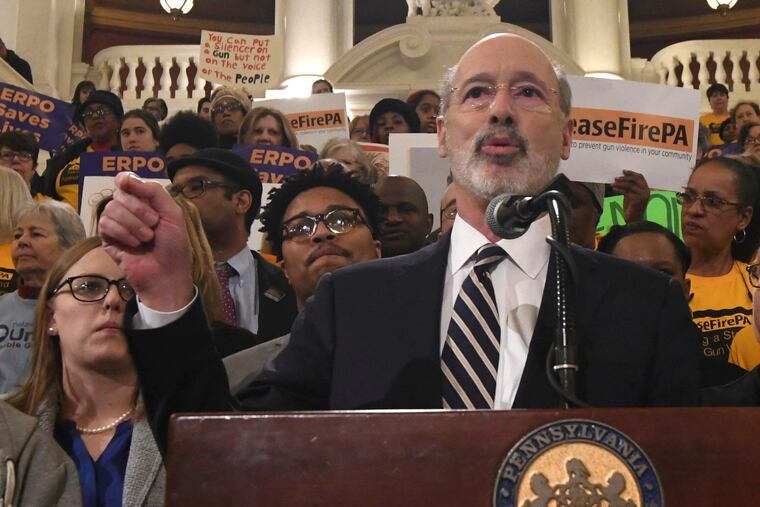Kudos to Gov. Tom Wolf for doing something on gun violence, but the General Assembly must do more | Editorial
While learning more about a problem is always a good thing, learning is no substitute for the political will to take action on gun laws that we know could make a real difference.

After the mass shooting in Dayton, chanters crying “Do Something!” interrupted a speech by Ohio Governor Mike DeWine. On Friday, after a bloody week in Philadelphia, Pennsylvania Gov. Tom Wolf did something: signed an executive order to address gun violence in the Commonwealth.
Gov. Wolf appointed former Philadelphia Police Commissioner Charles Ramsey to the new position of Senior Advisor for Gun Violence Prevention; he will coordinate the Commonwealth’s gun reform agenda.
Wolf’s first step in the reform is the convening of a Special Council on Gun Violence that will provide recommendations on how Pennsylvania can prevent community violence, mass shootings, domestic violence, suicide, and accidental shootings. The Gov. also called for an increase in data sharing and capacity to better understand gun violence. He also wants to invest more resources in training of police, bolstering gun buyback programs, and conducting more active shooter drills.
Wolf’s actions are not nothing, but executive action can only go so far.
While learning more about a problem is always a good thing, learning is no substitute for the political will to take action on gun laws that we know could make a real difference. Gov. Wolf ended his remarks reaffirming his support to multiple gun control laws that are stuck in the General Assembly.
Considering that amount of political capital that any gun related effort requires, it’s critical that we don’t invest too much in programs that won’t move the needle. For example, gun buyback programs -- usually police run initiatives that allow anyone to turn in any gun and get cash in return, no questions asked -- are popular but ineffective. Multiple studies found that efforts to buy hundreds of guns did not reduce homicides. That’s a problem considering that gun buybacks are not cheap. Last year, Philadelphia spent $33,000 on buying back 300 guns in one day -- an investment that research suggests would have no impact on gun violence. Similarly, an assault weapons ban, while important for the long run, probably won’t have a large impact in the short term because of the sheer number of assault weapons in the hands of civilians.
To complement the governor’s efforts, state lawmakers should take action on laws that research says can make a difference. They include:
Safe storage laws: Laws that require that guns be stored unloaded and behind a lock have shown to decrease firearm self-injuries-- by accident or suicide.
Waiting periods: Laws that require a waiting period before someone first shows interest and purchases a firearm have shown to be very effective in reducing gun violence. Multiple studies have shown that a waiting period would decrease suicide deaths.
Universal background checks: In Pa. a loophole in the background check system allows the private sale of a long gun without completing a background check. Background checks are important and research shows that they do prevent firearms from reaching high risk individuals. However, a more effective approach that could dramatically reduce gun violence would be following the example of ten states, by requiring a permit to purchase a firearm.